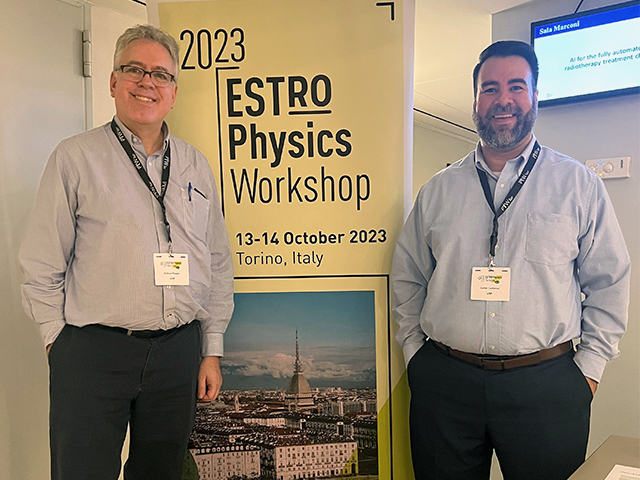 Richard Popple, Ph.D. (left) and Carlos Cardenas, Ph.D., represented the UAB Automated Planning Team at the ESTRO Physics Workshop contest in Turin, Italy, Oct. 13-14, 2023. UAB won first place in the competiton. Photo credit: Celine Dechamps, ESTRO.
Richard Popple, Ph.D. (left) and Carlos Cardenas, Ph.D., represented the UAB Automated Planning Team at the ESTRO Physics Workshop contest in Turin, Italy, Oct. 13-14, 2023. UAB won first place in the competiton. Photo credit: Celine Dechamps, ESTRO.
Medical physicists in the UAB Department of Radiation Oncology won first place in the European Society for Therapeutic Radiology and Oncology (ESTRO) 2023 Fully Automated Radiotherapy Treatment Planning Challenge. According to the competition website, this challenge sought to address the question, “How close are we to fully automated radiotherapy treatment planning?” Thirteen international teams from academic institutions and commercial entities participated in the competition, all tasked with leveraging artificial intelligence (AI) and software tools to fully automate radiotherapy treatment planning.
The UAB Automated Planning Team, “Killing Cancer With Code,” won first place in both phases of the competition, beating out competitors from other prestigious cancer centers around the world, including two from North America.
The UAB team is made up of five full-time medical physics faculty members: Rex A. Cardan, Ph.D.; Carlos E. Cardenas, Ph.D.; Joseph Harms, Ph.D.; Richard A. Popple, Ph.D.; and Eric Simiele, Ph.D.
During the online phase of the challenge, participants were provided with radiotherapy simulation CTs for 10 prostate cancer patients, together with a treatment intent/prescription. The cases were a mix of prostate only, prostate plus nodes, and post-operative prostate plus nodes treatment intents, representing the three most common clinical challenges encountered for prostate radiotherapy. Participants were asked to generate a treatment plan for each case in an “as-automated-as-possible way,” including identification of healthy organs and target volumes. The plans were scored based on radiation dose delivered to the prostate target volumes and the degree to which the healthy organs were spared unnecessary dose.
Popple, professor and assistant vice chair for Medical Physics in the Department of Radiation Oncology, and Cardenas, assistant professor and director of Automated Treatment Planning in the Department of Radiation Oncology and director of AI Research and Development for the Marnix E. Heersink Institute for Biomedical Innovation, represented UAB in the last phase of the competition, the ESTRO Physics Workshop contest in Turin, Italy, Oct. 13-14. This final phase enabled participants to demonstrate their systems and discuss the challenge and its results. According to Cardenas, UAB was the only team to demonstrate a fully automated process, requiring no human intervention.
This challenge was the culmination of a project the department’s Automated Planning Team began several years ago to improve standardization and quality of care through the use of automation at UAB.
“The challenge came at a perfect time for our team” observed Popple. “We were able to combine the software tools and infrastructure we have been developing over several years to build a one-click solution that generates high-quality radiotherapy treatment plans.” He added that, “in addition to providing us with a fixed timeline, participating in the challenge made our work toward building this clinical tool even more fun, winning the challenge was just the icing on the cake.”
Cardenas said the AI tools developed at UAB and demonstrated in this competition will soon have a positive impact on cancer care in Alabama. "The positive impact of these tools go well-beyond cancer care in Birmingham," Cardenas said.
“Our team has secured research funding from the Center for Clinical Translational Sciences (CCTS), supported by the National Institutes of Health, to evaluate feasibility of using automated planning tools at community cancer centers, partnering with Russell Medical Cancer Center (Alexander City, Alabama) on this project. This is a very exciting project as the integration of AI within radiotherapy represents a paradigm shift, not only technologically but also in its potential to redefine equitable health care delivery across the Southeast.”